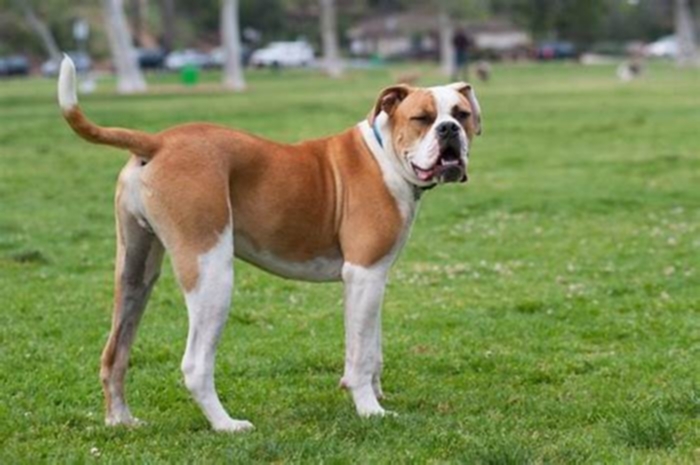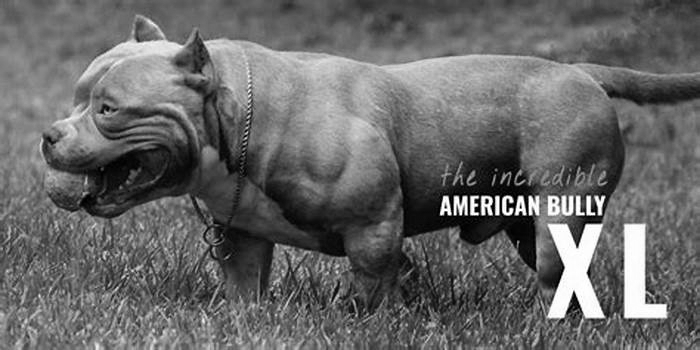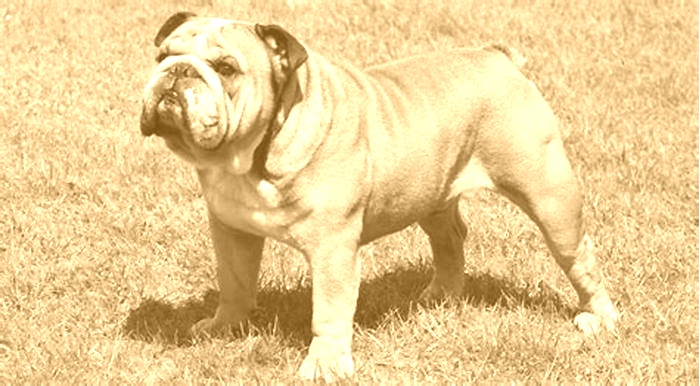Are Bulldogs aggressive

Are Bulldogs Aggressive? Important Things to Consider
Before you bring a Bulldog into your home, you need to know are Bulldogs aggressive?
When you picture a bulldog, the image that comes to mind is probably their stocky frame, their distinctive wrinkled face, and their friendly, if somewhat gruff, expression.
This leads you to wonder about their temperament and particularly, whether bulldogs are known for being aggressive.
Contrary to some misconceptions, bulldogs were historically bred to be tenacious, but today they have a reputation for being gentle and affectionate, making them well-suited as family pets.
Debunking the myth of the aggressive bulldog is essential when youre considering one as a pet. Bulldogs are often loyal dogs who form strong bonds with their families.
They are friendly and known to be patient, which can make them great companions for children as well.
Due to their sociable nature, bulldogs may likely greet you with enthusiasm rather than hostility.
In fact, their behavior is now characterized by a loving disposition rather than the aggressive traits of their past.
Understanding Bulldog Temperament

When you think of Bulldogs, the adjectives that should come to mind are friendly, affectionate, and gentle.
Exploring Bulldog temperament reveals a breed with inherent calmness countered by misconceptions influenced by media and culture.
Inherent Breed Characteristics
Bulldogs were originally bred for bull-baiting, but todays Bulldogs have a calm and friendly temperament.
Genetic factors have been tempered over time to favor a more gentle personality, making Bulldogs suitable as family pets.
The American Bulldogs, English Bulldogs, and French Bulldogs each have distinct traits, but they share an overall affectionate nature.
The Impact of Environment and Raising
A Bulldogs environment plays a crucial role in shaping its behavior. Early socialization and exposure to various stimuli help develop a well-rounded pet.
Bulldogs raised with care and companionship tend to reflect a friendly and relaxed demeanor. Neglect or poor treatment, conversely, can lead to fear-based aggression.
Signs and Causes of Aggression
Aggressive behavior in Bulldogs is often the result of fear or territorial instincts.
Recognize signs of aggression, such as growling, barking, or biting, which may indicate underlying issues.
Pain and health concerns may also cause a change in behavior, highlighting the importance of regular vet check-ups.
The Role of Health and Exercise
A Bulldogs health directly affects its temperament. Adequate exercise, a balanced diet, and attention to common issues like obesity and allergies keep Bulldogs healthy and happy.
Physical well-being is critical in maintaining a positive behavior and reducing aggression linked to discomfort or health issues.
Social Interactions with Children and Other Animals
Typically, Bulldogs are excellent companions for children and get along well with other pets, especially when introduced properly.
Socialization must be an ongoing process to ensure these dogs can navigate interactions without aggression while providing loyal companionship.
Bulldogs often appear as tough characters in media and popular culture, but this portrayal is a stark contrast to their true nature.
Awareness and education can help in debunking myths and highlighting their friendly and affectionate side.
Debunking Myths About Aggression
Many believe Bulldogs are inherently aggressive, yet studies and personal experiences typically reveal a breed that is far from that stereotype.
Ongoing breeding practices and responsible ownership have significantly reduced any natural aggressive tendencies in Bulldogs.
Differentiating Aggressive and Playful Behavior
Understanding Bulldog behavior includes recognizing the difference between playful actions and true aggression.
Playful barking, growling, and light nipping may be misconstrued as aggression; however, theyre often just a Bulldogs way of engaging in fun with their families.
Bulldog Training and Behavior Modification
Proper training and behavior modification are crucial in managing bulldog aggression.
These techniques can effectively shape your bulldogs temperament, ensuring they grow up to be loving and well-behaved pets.
Importance of Consistent Training
Consistent training lays the foundation for any successful behavior modification program.
With bulldogs, youll want to start training early, focusing on basic commands like sit, stay, and come.
Establishing a routine that includes daily obedience training helps your bulldog understand what is expected of them, which can greatly reduce instances of aggressive behavior.
Professional Training and When to Seek Help
If aggression issues persist or seem to be beyond your control, its wise to seek professional help.
Expert trainers or behaviorists can offer specialized, individualized training methods designed for your bulldogs unique temperament, which are crucial for managing complex behavior problems.
Socialization Techniques
Effective socialization is a preventative measure against aggression.
Early socialization exposes your bulldog to various situations, environments, people, and other animals, reducing fear and anxiety.
Regularly socializing your pet can lead to a more relaxed and friendly temperament, helping to prevent aggression.
Addressing Issues with Positive Reinforcement
Using positive reinforcement techniques during training encourages your bulldog to repeat desired behaviors.
This method involves rewarding good behavior with treats and praise, creating a positive association with obeying commands and behaving well.
Exercising Patience and Understanding
Training a bulldog requires patience and understanding, especially when addressing aggression.
Avoid frustration and maintain control of your emotions, as bulldogs can be sensitive to your mood.
Being patient helps establish a calm and trusting learning environment.
Role of Breeders and Responsible Ownership
Responsible ownership starts with choosing a reputable breeder who focuses on raising dogs with good temperaments.
Breeders play a role in the early stages of a dogs life, and selecting one who understands the importance of early socialization and proper breeding practices is crucial for preventing future aggression issues.
Managing and Redirecting Territorial Behavior
Bulldogs might show territorial aggression towards strangers or in new environments. Its important to remain calm and assertive, establishing yourself as the pack leader.
Redirecting their behavior with consistent training methods allows you to gain control and reinforce your bulldogs trust in your leadership.
Preventing Bulldog Aggression
In understanding how to prevent aggression in bulldogs, its vital to focus on proactive strategies that include committed training and proper socialization.
Maintaining a positive environment and attending to your bulldogs health are also key aspects.
Early Socialization and Its Benefits
Early socialization involves exposing your bulldog to various people, children, and other animals in a controlled and positive way.
The aim is to make these experiences as friendly and supportive as possible to reinforce that theres nothing to fear.
By doing this from a young age, you are less likely to encounter fear-based aggression as they grow.
Creating a Positive Home Environment
Your homes environment plays a crucial role in your bulldogs behavior. Create an atmosphere thats nurturing and loving, showing patience as they learn.
Offering a supportive environment helps to avoid behaviors stemming from anxiety or stress, making your bulldog a more loyal and friendly family pet.
Recognizing and Addressing Fear-based Aggression
Fear-based aggression can arise when dogs feel threatened. Recognizing the signs is essential.
If you notice your bulldog showing signs of fear, address these feelings right away.
Reassure them with a calm and patient demeanor and seek professional behavioral advice if needed.
Importance of Regular Exercise and Mental Stimulation
Bulldogs benefit greatly from both physical activity and mental challenges. Regular exercise helps to prevent boredom and can curb unwanted behavior.
Meanwhile, mental stimulationlike learning new trickskeeps their mind active.
A balanced blend of the two ensures your bulldog remains playful and engaged, fostering a harmonious companionship.
The Significance of Health Maintenance
Ongoing health maintenance is a crucial factor in preventing aggression.
Regular vet check-ups can identify and address any underlying health concerns that may affect your bulldogs behavior.
Keep up with the recommended veterinary care to safeguard against health issues turning into aggressive behavior.
Living with Bulldogs
Living with Bulldogs can be a fulfilling experience, as they are known for their companionship and friendly nature.
Your journey with a Bulldog will involve nurturing a strong bond, understanding their unique characteristics, and debunking common misconceptions.
Fostering a Bond with Your Bulldog
Establishing a deep bond with your Bulldog starts with consistent affectionate interaction from the day you bring them home.
Bulldogs thrive when they feel like a vital part of their humans life, which means regular companionship and interaction are key to their happiness.
Bulldogs as Family Companions
Welcoming a Bulldog into your family means adding a loyal and friendly member to your household.
Bulldogs often develop strong ties with all family members, making them excellent family pets, especially when socialized early with children and other family pets.
Dealing with Separation Anxiety and Boredom
Bulldogs can experience separation anxiety and boredom, which can lead to undesirable behavior.
To prevent this, ensure your Bulldog gets plenty of exercise, mental stimulation, and has a comforting environment when alone.
Understanding and Managing Protective Instincts
Known for their protective instincts, Bulldogs can be territorial.
While they are not typically guard dogs, they may show signs of territorial aggression if they perceive a threat. Proper training and socialization are essential in managing these instincts.
Choosing the Right Bulldog for Your Lifestyle
Choose a Bulldog whose individual temperament aligns with your lifestyle.
Consider factors like activity levels, compatibility with children, and how much time you can dedicate to companionship and training.
Strategies for Introducing Bulldogs to Strangers
When introducing Bulldogs to strangers, its important to do so in a controlled and friendly manner.
Socialization plays a significant role in helping your Bulldog differentiate between welcome guests and actual threats.
The Misconceptions About Bulldogs and Aggression
Contrary to misconceptions, Bulldogs are not inherently aggressive.
Media and popular culture may have distorted views; however, with love, patience, and proper training, Bulldogs are loyal, affectionate, and suitable companions for families.
Conclusion
When considering the temperament of Bulldogs, its important to address the common myth that they possess an inherently aggressive nature.
Contrary to this belief, Bulldogs are typically known for their friendly demeanor which makes them excellent companions.
Its your responsible ownership, including proper training and socialization, that greatly influences their behavior.
- Companionship:
- Bulldogs often form strong bonds with their owners and are known for their loving nature.
- Temperament and Aggression:
- Misconceptions about aggression largely stem from their historical use in bull-baiting, but todays Bulldogs are bred to be amiable and gentle.
Training and socialization play crucial roles in shaping any dogs temperament, and Bulldogs are no exception.
When provided with consistent guidance and positive interactions, these dogs often exhibit a calm and friendly outlook.
In sum, the idea of the Bulldog as an aggressive breed does not align with the characteristics commonly observed in responsibly-raised individuals from this breed.
Instead of aggression, expect a companion that thrives on affection and peaceful coexistence, provided they receive the care and guidance they deserve.
Are Bulldogs Aggressive? Frequently Asked Questions
When considering whether to bring a bulldog into your home, you might have questions about their behavior and aggression.
These frequently asked questions will give you insight into the typical conduct of bulldogs in various situations.
How do bulldog breeds typically behave with strangers?
Bulldogs may present a sturdy and confident appearance, but they are generally known to be friendly with strangers.
Their behavior can depend on early socialization and the specific personality of the dog.
What is the general temperament of bulldogs towards other dogs?
While bulldogs can be social and playful with other dogs, their temperament may vary. Some bulldogs are more dominant and may need clear boundaries when interacting with other dogs.
Can bulldogs show aggression towards their human family members?
Your bulldog is likely to be affectionate and loyal towards family members.
Aggression towards humans is not a characteristic trait of well-socialized and properly trained bulldogs.
Do bulldogs get along well with cats?
Bulldogs can coexist peacefully with cats, especially if they are raised together.
Each animal is unique, so proper introductions and supervision are important to foster a harmonious relationship.
Why might a bulldog display sudden changes in aggressiveness?
Sudden changes in a bulldogs behavior, including aggressiveness, could be caused by factors such as illness, pain, or lack of proper training.
Its important to consult with a veterinarian to rule out medical issues.
Comparatively, how do bulldogs aggression levels rank against other breeds, like pit bulls?
Bulldogs generally have a lower aggression level compared to some breeds that have a history of being bred for more aggressive tasks.
For instance, pit bulls might exhibit higher levels of dog-directed aggression but are not inherently aggressive towards people.









